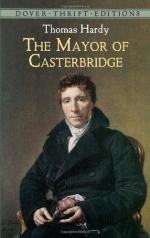He experienced not only the bitterness of a man who finds, in looking back upon an ambitious course, that what he has sacrificed in sentiment was worth as much as what he has gained in substance; but the superadded bitterness of seeing his very recantation nullified. He had been sorry for all this long ago; but his attempts to replace ambition by love had been as fully foiled as his ambition itself. His wronged wife had foiled them by a fraud so grandly simple as to be almost a virtue. It was an odd sequence that out of all this tampering with social law came that flower of Nature, Elizabeth. Part of his wish to wash his hands of life arose from his perception of its contrarious inconsistencies—of Nature’s jaunty readiness to support unorthodox social principles.
He intended to go on from this place—visited as an act of penance—into another part of the country altogether. But he could not help thinking of Elizabeth, and the quarter of the horizon in which she lived. Out of this it happened that the centrifugal tendency imparted by weariness of the world was counteracted by the centripetal influence of his love for his stepdaughter. As a consequence, instead of following a straight course yet further away from Casterbridge, Henchard gradually, almost unconsciously, deflected from that right line of his first intention; till, by degrees, his wandering, like that of the Canadian woodsman, became part of a circle of which Casterbridge formed the centre. In ascending any particular hill he ascertained the bearings as nearly as he could by means of the sun, moon, or stars, and settled in his mind the exact direction in which Casterbridge and Elizabeth-Jane lay. Sneering at himself for his weakness he yet every hour—nay, every few minutes—conjectured her actions for the time being—her sitting down and rising up, her goings and comings, till thought of Newson’s and Farfrae’s counter-influence would pass like a cold blast over a pool, and efface her image. And then he would say to himself, “O you fool! All this about a daughter who is no daughter of thine!”
At length he obtained employment at his own occupation of hay-trusser, work of that sort being in demand at this autumn time. The scene of his hiring was a pastoral farm near the old western highway, whose course was the channel of all such communications as passed between the busy centres of novelty and the remote Wessex boroughs. He had chosen the neighbourhood of this artery from a sense that, situated here, though at a distance of fifty miles, he was virtually nearer to her whose welfare was so dear than he would be at a roadless spot only half as remote.
And thus Henchard found himself again on the precise standing which he had occupied a quarter of a century before. Externally there was nothing to hinder his making another start on the upward slope, and by his new lights achieving higher things than his soul in its half-formed state had been able to accomplish. But the ingenious machinery contrived by the Gods for reducing human possibilities of amelioration to a minimum—which arranges that wisdom to do shall come pari passu with the departure of zest for doing—stood in the way of all that. He had no wish to make an arena a second time of a world that had become a mere painted scene to him.




